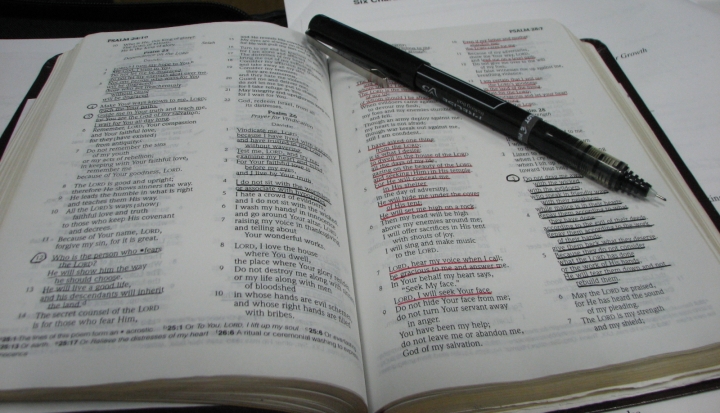Respondents to a U.S. Catholic survey on the Bible are confident when it comes to scripture, but even they recommend reading the Good Book with knowledgeable guides to show you around biblical times and places.
The latest fad in The self-help aisle at your local bookstore claims to reveal the centuries-old “secret” that positive thinking leads to the good life: “As you learn The Secret, you will come to know how you can have, be, or do anything you want. . . . You will come to know the true magnificence that awaits you in life.”
These prospects sound nice, especially when you compare it to Jesus’ centuries-old promise: “Blessed are those who are persecuted for righteousness’ sake, for theirs is the kingdom of heaven” (Matt. 5:10). While both passages promise great reward, positive thinking seems a lot easier than persecution. The Beatitudes require that a Christian be poor in spirit, meek, and mournful to receive any reward, but these qualities hardly seem like “the true magnificence” promised by Rhonda Byrne’s The Secret (Atria Books/Beyond Words) in this life.
Still, the Bible remains the ultimate self-help book for respondents to a U.S. Catholic survey on the Good Book. More than 80 percent say Bible reading is an important spiritual practice and 65 percent read it at least once a week. Moreover, 83 percent say they find its stories relevant to their own lives and problems. “The books of the Bible are written by folks who are just like us: same struggles, same doubts, same joys, and same need to love and be loved,” says Jim Sullivan of Seattle, Washington.
Those who respond to a survey on the Bible likely fall into a self-selected group of Bible enthusiasts, but if the stereotypes are true, the majority of Catholics are not as comfortable picking it up as these survey respondents. Even regular Bible readers report that it can sometimes be gruesome, confusing, and challenging, but they still return to it again and again for study, prayer, and guidance.
Before Bible readers can ask what a story means to them, they must understand it. “Reading without help is too much work,” says Mary Cronin of Shelter Island Heights, New York, who only reads the Bible on special occasions.
Those who don’t read the Bible regularly tend to get caught up in language, long family trees, and difficult names. A reader from Chester, Maryland struggles with “long-winded sentences and hidden meanings.” He says that he doesn’t read the Bible because “I would interpret it incorrectly.”
Even for those who read the Bible every day, Genesis is hard to understand in the light of evolution, parables can seem cryptic, and both the themes and symbolism of the Book of Revelation are frightening. It’s “as if someone on acid wrote parts of it,” a reader from Naperville, Illinois writes of the Bible’s last book.
While other readers relate to these problems, many have found the answer. “It was difficult to understand many parts of the Bible until I got The Catholic Study Bible: New American Bible (Oxford University Press) and joined Bible study groups,” says Mary Smith of Gaithersburg, Maryland. “The more you read, the more rewarding it gets.”
Bible study groups also helped a reader from Mahomet, Illinois figure out how to get started, a big obstacle for someone who doesn’t have a habit of reading the Bible. “I am forced to do homework, to open the Bible to read, pray, and think,” she says. “If left to my own devices, I’m overwhelmed by the wide range of choices and the size of the book. Where do I start? How?”
Talking with fellow parishioners can be beneficial, but some want even more. A Spokane, Washington reader, for instance, says she wants “a good theologian by my side to answer questions.”
The most common questions: “What situations were [the authors] actually addressing? How much of the Bible is culturally conditioned?” as Jane Mellem of Littleton, Colorado writes. The context of two sometimes related issues particularly trouble readers: women and violence.
“When it comes to women and Paul, I must constantly remind myself of the time and place in which he lived and wrote his letters,” says Rosemary D’Ascenzo of Pittsburgh, Pennsylvania.
Old Testament stories that are supposed to reveal God’s nature also perplex readers. In stories such as the conquest of Canaan, Noah’s ark, Judges 11 (Jephthah sacrificing his daughter), Job, and Abraham and Isaac, God seems violent, vengeful, or illogical.
“The Old Testament portrait of God [is] as a pretty mean feller,” writes Bill Baye of Green Bay, Wisconsin. But again, putting the stories in context can help reconcile an image of a loving God with more troubling images. “We need to read the Bible as a book written 2,000 to 4,000 years ago and dramatically influenced by the writers’ cultures and limited knowledge of science and the world,” Baye continues.
Stories of war, corruption, and the mistakes of our spiritual ancestors also can teach us something about modern conflicts, other readers argue. “There’s just as much garbage going on in biblical days as there is today. It shows me our problems are not unique—God has seen it all before,” says Kathy Ishmael of Woodstock, Georgia.
In order to understand the distant times and places of the Bible and its implications for today, 59 percent of respondents turn to books by scriptural scholars for further research. “I love checking the history of the time and searching out other resources,” writes Nancy McAleer from Sterling Heights, Michigan. “Ten minutes of reading the Bible can lead me to days of further research.”
Days of research, however, might be intimidating for a Bible beginner and unrealistic for busy people. Rita May’s favorite quote invites her to “Be still and know that I am God,” but the Richmond, Missouri woman says she finds little time to be still and read the Bible because of family and other obligations. Even a priest, Father Mark Stoll of Moville, Iowa, says he lacks time because of “the amount of reading I do of other books and literature, including U.S. Catholic, regarding spirituality.” Reading the Bible, however, can be a short act of daily prayer rather than an intellectual exercise.
Peggy Kelley of Columbus, Ohio makes room for Bible reading and prayer by waking up a half hour before her children to read the Abide in My Word scripture reading and commentary and the Daily Word reflection. “I try to meditate for 10 to 15 minutes after reading,” she says.
Reflections are quick, easy ways to help readers open up the scripture and pray with it. Along with Kelley’s suggestions, readers commonly listed God’s Word Today, The Word Among Us, Living Faith, and Magnificat.
Morning is a popular time to pray with the Bible. Readers often use the Liturgy of the Hours and lectio divina to pray with the Bible when they wake up. While many aim to read a chapter a day, praying often requires much less than that, sometimes even just a phrase. “I only read a few lines a day, which sets the theme of my day,” writes Brother Chuck McKenna, C.F.C. of Burbank, Illinois. “I go through the New Testament in order and then start over again.”
Others look up specific passages for prayer, especially Psalms, or just open the book at random, “and see where God is leading me today,” as a reader from St. Louis, Missouri puts it.
No matter how one approaches the Bible, studying it or praying with it, readers are trying to discern what the Bible means for them. “I find the Bible inspirational and a guide for living my life, especially in terms of how to treat other people,” says Lois McClave of Oakland Park, Florida. Indeed the Bible is full of both good and bad examples of how to live, commandments, and “formulas for daily living,” as Joan Zelten of Poland, Maine calls her favorite passage, the Beatitudes.
But the Beatitudes and stories that ask a lot of Christians—Jesus calling his disciples to follow him, sending away the rich young man, and washing his disciples’ feet, to name a few—are counted among the most difficult passages as well as readers’ favorites. The hardest part of reading scripture for a reader from Virginia Beach, Virginia isn’t time or understanding; it is “living it,” he writes.
While Catholics turn to the Bible for God’s advice and insight, it is not simply a self-help book that fixes Christians’ problems. Instead the Bible forces its readers to ask questions, look at their own lives, and come back to it for more. It may be challenging, but for many U.S. Catholic readers, the Bible isn’t a secret at all.
And the survey says…
1. Reading the Bible is an important spiritual practice to me.
81% – Agree
11% – Disagree
8% – Other
2. I read the Bible:
47% – Every day.
18% – Once a week.
4% – Once a month.
8% – On special occasions.
8% – Rarely or never on my own.
15% – Other.
3. The fact that the scriptures sometimes seem to contradict themselves bothers me a lot.
9% – Agree
86% – Disagree
5% – Other
4. I identify with biblical characters and find biblical stories relevant to my life and problems.
83% – Agree
11% – Disagree
6% – Other
5. Hearing the Sunday readings is as close as I come to reading the Bible.
76% – Disagree.
11% – Agree and that’s OK.
9% – Agree and I want to change that.
4% – Other.
6. Compared to the way fundamentalists, who take the Bible literally, use it, I (may select more than one):
75% – Know the truths of the Bible, even if I’m less concerned with their details and factual basis.
18% – Will quote chapter and verse along with them.
9% – Shy away from the Bible because of those who interpret it literally.
14% – Other.
Representative of “other”:
“The Bible must be understood as a whole and appreciated in the framework of the communities to which it was addressed. ‘Fundamentalists’ err in interpreting bit parts in a vacuum.”
7. I find that the language, history, and culture of the Bible are so different from my experience that it is difficult to understand its significance for me.
11% – Agree
80% – Disagree
9% – Other
This article appeared in the September 2007 issue of U.S. Catholic (Vol. 72, No. 9, pages 18-23).














Add comment